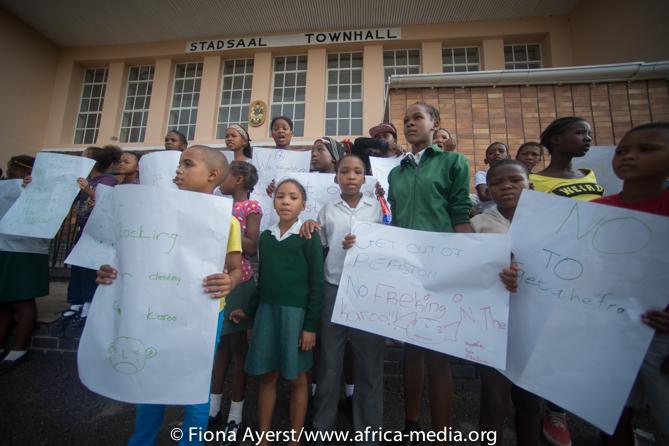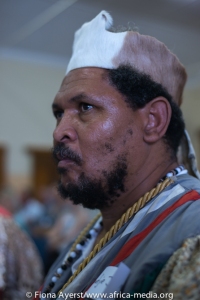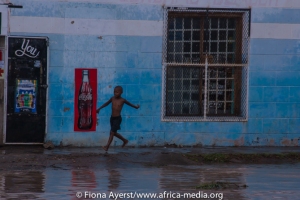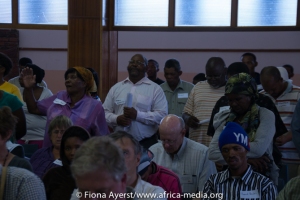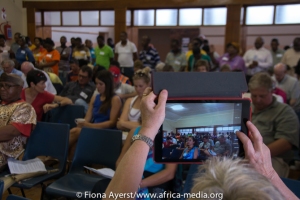Fissures and Schisms
It appears that fracking will certainly be cracking- but not only the rocks.
On a steamy Karoo Friday 13th Feb 2015 I sat through a regulatory public meeting in the Pearston town hall.The meeting had been convened by Australian owned Bundu Oil &Gas (“Bundu”).They (together with Falcon and Shell) want the right to explore the shale rock under the Karoo crust looking for gas. Fracking is the slang term for hydraulic fracturing (for the uninitiated there is a description of what fracking is under this post courtesy of Julienne du Toit of Karoo Space), which is being touted by the government as a potential solution to both current and long-term energy crises in South Africa. Outside the Pearston town hall a group of school children had let Bundu know how they felt, with placards
The issue of fracking is shamelessly splitting people into sides. For many South Africans, since the end of apartheid, there has been a wobbly but growing sense of nationhood in a race-sensitive society and fracking threatens to tipple this balance back to the wrong side. In the red corner, for fracking, we have the multitude of unemployed in the arid Karoo basin. In the green corner, against drilling into the crunchy crust we have the minority; white landowners; farmers or “boers”. The farmers are, for the most part, concerned for their groundwater spreading in arteries across the Karoo, linking farms and lives.
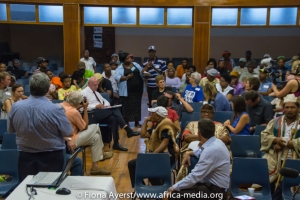
The meeting was split into those who had no jobs and needed them, and the farmers: it was a real boxing ring
Also present at the meeting were the first indigenous people who are now split into many clans; the Khoikhoi (“Khoi”) whose forefathers hunted and gathered (and ultimately herded) in the Karoo.The Khoi clans have taken a stance and now sit, somewhat surprisingly, in the green corner. They say the exploration guys are misleading the people and their promises of employment somewhere;sometime in the future,simply cannot be true. They may be “right on the money”.
As I sat straining to hear the debate a sudden and violent storm blew up,bringing loud claps of thunder and gushes of muddy water down the main street of the impoverished village of Pearston; there was a palpable wondering- was the storm a portent of massive possibility or massive loss? Could the turbulent muddy water mean wealth and abundance for all or was it a premonition of looming trouble?
Pearston is in the Karoo, a thirsty semi-desert stretching, across a third of South Africa that is ecologically rich. It is also one of the country’s poorest regions economically. In some of the smallest towns of the Karoo unemployment is as high as 90%, with welfare grants often the main source of income. In Graaff-Reinet, one of the wealthiest towns of the Karoo, unemployment figures are more than 30% and increasing according to the Democratic Alliance’s Samantha Jankovich.
The issue of employment was a rift which was already more than a hairline fracture. As Friday the 13th of February 2015 wore on, so the crack grew to a chasm.
When it was pointed out that the local unemployed were expecting something along the lines of Mossel Bay’s PetroSA, Robert Willes, the MD of Bundu stood up and set the record as straight as a crooked line. True story (he really used all these avoiding words i have put in italics I promise):
“We don’t think this (another Petro-SA ) will happen here. The gas we get will goes into power generation somewhere else and Bundu won’t be involved. It’s really hard to be specific about this because we don’t know how all these steps are going to work or if the business is going to work at all.”
“There would probably be some sort of development somewhere in the exploration area and perhaps the dimensions of such a development might be measured in tens of square kms rather than thousands. I think we would probably be looking at some direct employment.” Willes ended this ambiguous monologue by promising to be cognisant of unemployment problems.
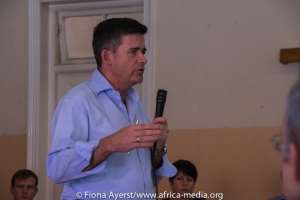
Robert Willes of Bundu tries to explain gently that there will be very few jobs for locals. He needs a 100% score for avoidance techniques.
Even after Willes’ vague rhetoric regarding employment local ANC stalwart and religious leader of the Pearston community Jersey Charlie said to thunderous applause:
“I was born here in Pearston in 1947 and grew up here. We are suffering here. We are going to stand together and hope there is gas. The gas exploration must go on.The people who say that Bundu must not be here, those are the rich people.We say Bundu must come. Bundu, no one can stop you. The oil is there. The gas is there. The people must have all this. Stop pushing us down!”
Charlie Froelich (88) a former major of Pearston said:
“I think there has been a misunderstanding about job creation. The people here think they are going to get rich and that there will be permanent jobs. That is not going to happen.”
There was applause from the people sitting around Froelich but the crowd at the back were heckling Froelich, saying
“You’re already rich (sic)!”
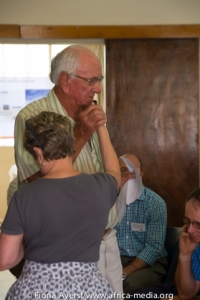
Charlie Froelich repeated what Willes had said without using platitudes, but the crowd didn’t think he was telling the truth
The Bundu Updated Environmental Management Programme Report in support of the application for petroleum exploration rights (sic) is on the www. On page 49 paragraph number 6.6.4.5;
” …The reality is that the majority of work …will be carried out by skilled professionals. Initial work (it came out in the meeting that this could take up to nine years) will be desk-based. The actual period during which drilling crews will be in the field will be limited to a few months. The appointed drilling contractor is likely to bring in a skilled team to operate their drill rigs. There may be limited opportunities for local labour, but these cannot be assured at this stage”.
In a 2012 report by the South African Dept. of Mineral Resources: it is stated that fracking, could have a “major impact on the national economy” and create “direct employment opportunities…likely to number in the tens of thousands”.
So on and so forth; the day proceeded with the elements mirroring the separation. As massive drops began to sputter on the tin roof, Jean Burgess, Princess of the Gonaqua Khoi said emphatically to a heckling audience:
“There aren’t lots of jobs. Maybe three or four but in my book that’s not lots. I think ten is a lot “
As far as the African National Congress is concerned – secretary-general Gwede Mantashe has announced that moving ahead with fracking is non-negotiable for a government keen to kick-start the stagnating economy and South African fractivists may end up in court.
Instead of uniting a local community it seems that fracking is set to divide the Karoo not only literally but also figuratively. Splitting rocks is something the applicants Shell; Bundu and Falcon have much collective experience with. Dividing people is another story altogether and a dangerous one with the potential to cough-up more than just a natural disaster. It appears that the foreigners may not have considered that they sit on a fine line and could alienate everyone from everything. The ripple effect of deeper rifts in both the land and the people of the Karoo could prove cataclysmic to this sensitive area and its people.
Fiona Ayerst
February 2015
What is fracking in easy terms ? ( words by Julienne du Toit of www.karoospace.co.za . If you want more info on fracking and the current state of affairs please follow Karoo Space as they live in the area and all the reports there are hot off the press )
Fracking is short for ‘hydraulic fracturing’, an American way of breaking up rock deep underground using millions of litres of water, sand and chemicals pumped deep into the earth under high pressure.
This creates cracks in the rock, releasing gas.
The gas is called methane, but some people call it shale gas. If it is ever extracted in South Africa, this gas would probably be used to generate electricity.
Fracking is a method that was first used in America in 1949, to ‘stimulate’ oil wells that were close to being depleted.
But the fracking being done now is very different to what was done then. In the 1990s, a new method was been pioneered and is technically known as horizontal slickwater hydraulic fracturing
It uses far more water and far more chemicals than the old ways of fracking.
Each time they frack a well, they use between 6 million and 25 million litres of water. This is enough to fill between 3 or 10 Olympic-sized swimming pools.
In addition, they use up to 20 tons of chemicals, along with sand.
In this method, the drill is turned sideways once it reaches the shale layer (usually 3km or more underground) and can go at least another 2km. Then small explosive charges are set off underground to create cracks in the rock. The sand is there to keep the tiny cracks open.
The gas then comes up to the surface, along with between 30 and 60 percent of the wastewater, which is toxic and has to be disposed of as hazardous waste.
